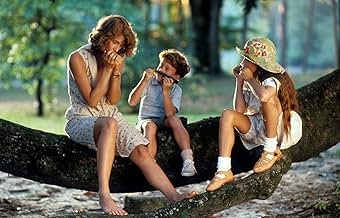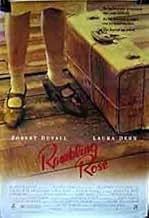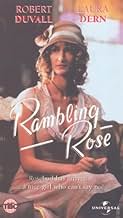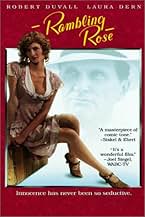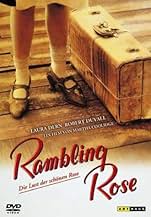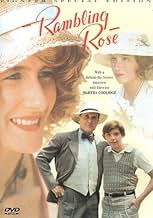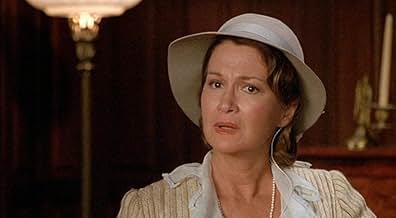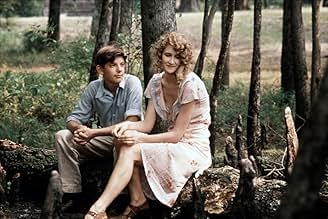IMDb-BEWERTUNG
6,5/10
5807
IHRE BEWERTUNG
Eine junge Frau, die Sexualität ausstrahlt, kämpft mit der Versuchung.Eine junge Frau, die Sexualität ausstrahlt, kämpft mit der Versuchung.Eine junge Frau, die Sexualität ausstrahlt, kämpft mit der Versuchung.
- Für 2 Oscars nominiert
- 6 Gewinne & 15 Nominierungen insgesamt
Robert John Burke
- Dave Wilkie
- (as Robert J. Burke)
Taylor Sutherland
- Billy
- (as Matt Sutherland)
Robin Robertson
- Young Salesman
- (as Robin Dale Robertson)
John Ratch Hart
- Crowd Person
- (Nicht genannt)
Empfohlene Bewertungen
Buddy recalls the Great Depression when Rose (Laura Dern) came to work for his family. She escaped prostitution in Birmingham to be the domestic servant. Kindly mother Hillyer (Diane Ladd) is partly deaf and was orphaned young. Rose flirts with father Hillyer (Robert Duvall) but he rebuffs her. Young Buddy (Lukas Haas) has a sexual encounter with Rose. She is desperate to stay and convinces him to keep it a secret. She continues to be flirtatious with the town's men. Father wants to send Rose away while mother argues to keep her.
This is a nostalgic jazzy rambling reminiscence of a compelling character. My only problem is that this movie takes a light tone making this almost a fable. Despite the childhood point of view, it needs to go for a darker mood to fit this sexualized tragedy. Director Martha Coolidge is caught between making a kid's coming of age journey and a young woman's walk on a dangerous tight rope. The light airy mood keeps the darker material at a distance.
This is a nostalgic jazzy rambling reminiscence of a compelling character. My only problem is that this movie takes a light tone making this almost a fable. Despite the childhood point of view, it needs to go for a darker mood to fit this sexualized tragedy. Director Martha Coolidge is caught between making a kid's coming of age journey and a young woman's walk on a dangerous tight rope. The light airy mood keeps the darker material at a distance.
If you grew up Southern you always have a thing about Hollywood actors trying to put on a Southern accent. I cringe when I hear Paul Newman, his wife Joan Woodward or Elizabeth Taylor trying to be "Southern." I liked "Rambling Rose" because, for once, the actors nailed it. Only to be expected, I guess, since Diane Ladd is from Mississippi and Laura Dern is her daughter. (So how to explain Robert Duvall, who grew up in San Diego? Well, he's just one helluva an actor.) Aside from the accents, the acting was outstanding.
Also I thought the soft summery lighting was perfect, unlike some period movies that seem done in comic book colors. I wonder where the location scenes were shot--anybody know?
The story itself wasn't great, but was above average, IMHO.
Also I thought the soft summery lighting was perfect, unlike some period movies that seem done in comic book colors. I wonder where the location scenes were shot--anybody know?
The story itself wasn't great, but was above average, IMHO.
My review was written in July 1991 after watching the film at a Times Square screening room.
Calder Willingham's memoir of the South "Rambling Rose" allows a talented ensemble to deliver the year's best screen acting so far. Funny and moving tale of an oversexed young woman will attract class audiences after its film festival exposure and has the potential to cross over to mainstream hit status.
It is difficult to conjure up another actress to embody Rose better than Laura Dern, whose tall, angular figure and striking (rather than beautiful) face under a row of curls personifies the naive title character.
She's a girl from the wrong side of the tracks who starts her life over as maid to the family of Robert Duvall and Diane Ladd in a small Georgia town in 1935. Rose is under a cloud, and it turns out that rumors of having been forced into prostitution at a tender age are true.
Both Duvall and his 13-year-old son Luka Haas are immediately taken by Dern's raw sexuality, yet it is the boy who nearly has his first conquest with her when Dern innocently gets in bed with him one night in a funny and risque scene.
Duvall is a proper gentleman, rejecting Dern's attempt at seduction and quickly adopting a fatherly concern for her. Family matriarch Ladd (Dern's real-life mom) is a Yankee educated at Columbia University, who also takes Dern under her wing and defends the girl under all circumstances.
Main source of conflict is Dern's promiscuous activities, which cause young men to loiter outside the house at all hours. This brings Duvall no end of grief in dealing with his uncontrollable charge.
Film climaxes in a classic scene involving Dern's future following her pregnancy scare that turns out to be an illness. Duvall and a stern Yankee doctor (terrifically played by Kevin Conway) come to a gentleman's agreement that a radical hysterectomy will end her loose ways. When Ladd stands up for the girl's rights, eliciting an apology and emotional turnaround from Duvaol, the film's main themes have been driven home with uncommon force and precision.
Pic is bookended by a scene of John Heard in 1971 portraying Haas grown to middle age, recalling the story and learning of Rose's fate from his aged father. Device is the film's weakest link but does not detract from the power of the main footage.
Dern's naturalness in a very eccentric role confirms the promise of her earlier work and makes Rose one of the most memorable characters in recent cinema. Duvall and Ladd play off each other to perfection, with Duvall maximizing all the humor inherent in author Willingham' odd turns of phrase.
The wide-eyed innocence and curiosity Haas brings to hsis rites-of-passage assignment are remarkable and help avoid the potential tastelessness in Dern's "robbing the cradle" scene with him. As his younger siblings, Lisa Jakub and Evan Lockwood also are affecting.
Director Martha Coolidge and herf technical crw have recreated the detail and texture of southern life with great feeling, filming this Carolco-financed picture at Carolco's Wilmington, North Carolina studio (formerly owned by the defunct De Laurentiis Entertainment Group). Like "Driving Miss Daisy", this quaint setting allows moral issues to be developed with subtlety rather than the inevitable didactic approach of a modern story.
Elmer Bernstein's warm musical accompaniment is a key asset to the film, but Nat King Cole's '60s pop hit "Rambling Rose" is not used on the soundtrack.
Depending on the impact of the year-end releases, "Rambling Rose" stands a good chance of being remembered come awards time. Pic has its world premiere August 22 as the opening night selection at the Montreal Film Festival.
Calder Willingham's memoir of the South "Rambling Rose" allows a talented ensemble to deliver the year's best screen acting so far. Funny and moving tale of an oversexed young woman will attract class audiences after its film festival exposure and has the potential to cross over to mainstream hit status.
It is difficult to conjure up another actress to embody Rose better than Laura Dern, whose tall, angular figure and striking (rather than beautiful) face under a row of curls personifies the naive title character.
She's a girl from the wrong side of the tracks who starts her life over as maid to the family of Robert Duvall and Diane Ladd in a small Georgia town in 1935. Rose is under a cloud, and it turns out that rumors of having been forced into prostitution at a tender age are true.
Both Duvall and his 13-year-old son Luka Haas are immediately taken by Dern's raw sexuality, yet it is the boy who nearly has his first conquest with her when Dern innocently gets in bed with him one night in a funny and risque scene.
Duvall is a proper gentleman, rejecting Dern's attempt at seduction and quickly adopting a fatherly concern for her. Family matriarch Ladd (Dern's real-life mom) is a Yankee educated at Columbia University, who also takes Dern under her wing and defends the girl under all circumstances.
Main source of conflict is Dern's promiscuous activities, which cause young men to loiter outside the house at all hours. This brings Duvall no end of grief in dealing with his uncontrollable charge.
Film climaxes in a classic scene involving Dern's future following her pregnancy scare that turns out to be an illness. Duvall and a stern Yankee doctor (terrifically played by Kevin Conway) come to a gentleman's agreement that a radical hysterectomy will end her loose ways. When Ladd stands up for the girl's rights, eliciting an apology and emotional turnaround from Duvaol, the film's main themes have been driven home with uncommon force and precision.
Pic is bookended by a scene of John Heard in 1971 portraying Haas grown to middle age, recalling the story and learning of Rose's fate from his aged father. Device is the film's weakest link but does not detract from the power of the main footage.
Dern's naturalness in a very eccentric role confirms the promise of her earlier work and makes Rose one of the most memorable characters in recent cinema. Duvall and Ladd play off each other to perfection, with Duvall maximizing all the humor inherent in author Willingham' odd turns of phrase.
The wide-eyed innocence and curiosity Haas brings to hsis rites-of-passage assignment are remarkable and help avoid the potential tastelessness in Dern's "robbing the cradle" scene with him. As his younger siblings, Lisa Jakub and Evan Lockwood also are affecting.
Director Martha Coolidge and herf technical crw have recreated the detail and texture of southern life with great feeling, filming this Carolco-financed picture at Carolco's Wilmington, North Carolina studio (formerly owned by the defunct De Laurentiis Entertainment Group). Like "Driving Miss Daisy", this quaint setting allows moral issues to be developed with subtlety rather than the inevitable didactic approach of a modern story.
Elmer Bernstein's warm musical accompaniment is a key asset to the film, but Nat King Cole's '60s pop hit "Rambling Rose" is not used on the soundtrack.
Depending on the impact of the year-end releases, "Rambling Rose" stands a good chance of being remembered come awards time. Pic has its world premiere August 22 as the opening night selection at the Montreal Film Festival.
I haven't seen this film in quite a while but I have pretty good memories about it. It's an intriguing film, something different and appealing even though some of the subject matter is "inappropriate."
I saw the last word because it involves a 13-year-old boy whose hormones are raging and his brief relationship with a grown woman. There is one sex scene that may make people squirm a bit, so be forewarned. Other than that, I don't remember anything else objectionable.
I like the photography and always enjoy seeing the old days - here it's the 1920s and 1930s - portrayed on today's films with the great cameramen and directors of today. Also, the South has some beautiful scenery that is eloquently on display here.
The story is well-acted with real-life mother-daughter Diane Ladd and Laura Dern, along with Robert Duvall and Lukas Haas. The latter plays the young man and was already somewhat of a star after playing the young Amish boy in the 1985 film "Witness." Duvall is one of the finest actors of his generation so you always get a good performance out of him.
This is a pretty low-key story but never puts you to sleep. Modern day feminists might like this film was Ladd plays that role to the hilt. Dern also delivered, making a very believable "Rose."
I saw the last word because it involves a 13-year-old boy whose hormones are raging and his brief relationship with a grown woman. There is one sex scene that may make people squirm a bit, so be forewarned. Other than that, I don't remember anything else objectionable.
I like the photography and always enjoy seeing the old days - here it's the 1920s and 1930s - portrayed on today's films with the great cameramen and directors of today. Also, the South has some beautiful scenery that is eloquently on display here.
The story is well-acted with real-life mother-daughter Diane Ladd and Laura Dern, along with Robert Duvall and Lukas Haas. The latter plays the young man and was already somewhat of a star after playing the young Amish boy in the 1985 film "Witness." Duvall is one of the finest actors of his generation so you always get a good performance out of him.
This is a pretty low-key story but never puts you to sleep. Modern day feminists might like this film was Ladd plays that role to the hilt. Dern also delivered, making a very believable "Rose."
An ingénue nymphomaniac's turbulent life rooted in the 1930s depression period of southern USA, served as a housemaid in a hotel owner's home, our heroine Rose, an uncultured but stalwart gal whose miserable past is the hidden wound cuts her deep and being unaware of her sex-addicted disposition, her path of looking for Mr. Right is rather bumpy and poignant.
The film is narrated by Buddy, the eldest son of the hotel owner, Rose is his first love and always occupies a special place in his heart. Although Rose is the potent pillar of the film, female director Martha Coolidge has steadily integrates a handful of equally vivid characters (young Buddy, his Daddy and Mother) into a moderate template of chanelling and rescuing Rose from her self-destructive hazard, despite of wanting any laudable gambits in highlighting the narrative skills and the plot is always stuck into a hoary frivolousness, the complete work is at best satisfactory.
The film is noteworthy by setting a record in the history of the academy by virtue of a real mother-daughter pair garners two Oscar nominations in the same film, Dern and Ladd (a second collaboration in a film after Lynch's WILD AT HEART 1990, 7/10) both showcase their stunning acting bent. Dern has nailed a quite innately delicate role since Rose is the damaged goods by nature, but her pure kindness and innocence hasn't been impaired and her female vulnerability is the real gem under the circumstance, even if she would mature gracefully later and give a more challenging and nail-biting performance in Lynch's INLAND EMPIRE (2006, 7/10), this film is among the crests of her filmography nonetheless. Ladd, after the pompous and lavish turn in WILD AT HEART, unexpectedly chooses a more positive and orthodox good-lady embodiment, her award-worthy moment confidently present itself in the latter part of the film, and single- handedly salvaging Rose from the misogyny from seedy male-predominance. But Duvall is also glittering in his category-fraud (I put him in leading) portrait of a man who is much wiser than he initially appears, and a juvenile Lukas Haas, almost being provocative while driven by curious sex impulse to take advantage of Rose, which might be the most contentious segment of the film per se, and at least he acts like a pro.
My final conclusion is that regardless of its maternal inclination of female-skewing demography, it is indeed a thespian playing field with decent fodder.
The film is narrated by Buddy, the eldest son of the hotel owner, Rose is his first love and always occupies a special place in his heart. Although Rose is the potent pillar of the film, female director Martha Coolidge has steadily integrates a handful of equally vivid characters (young Buddy, his Daddy and Mother) into a moderate template of chanelling and rescuing Rose from her self-destructive hazard, despite of wanting any laudable gambits in highlighting the narrative skills and the plot is always stuck into a hoary frivolousness, the complete work is at best satisfactory.
The film is noteworthy by setting a record in the history of the academy by virtue of a real mother-daughter pair garners two Oscar nominations in the same film, Dern and Ladd (a second collaboration in a film after Lynch's WILD AT HEART 1990, 7/10) both showcase their stunning acting bent. Dern has nailed a quite innately delicate role since Rose is the damaged goods by nature, but her pure kindness and innocence hasn't been impaired and her female vulnerability is the real gem under the circumstance, even if she would mature gracefully later and give a more challenging and nail-biting performance in Lynch's INLAND EMPIRE (2006, 7/10), this film is among the crests of her filmography nonetheless. Ladd, after the pompous and lavish turn in WILD AT HEART, unexpectedly chooses a more positive and orthodox good-lady embodiment, her award-worthy moment confidently present itself in the latter part of the film, and single- handedly salvaging Rose from the misogyny from seedy male-predominance. But Duvall is also glittering in his category-fraud (I put him in leading) portrait of a man who is much wiser than he initially appears, and a juvenile Lukas Haas, almost being provocative while driven by curious sex impulse to take advantage of Rose, which might be the most contentious segment of the film per se, and at least he acts like a pro.
My final conclusion is that regardless of its maternal inclination of female-skewing demography, it is indeed a thespian playing field with decent fodder.
Wusstest du schon
- WissenswertesDiane Ladd and Laura Dern's Oscar nominations mark the first time a mother and daughter ever received such an accolade for appearing in the same film. The only other time that a parent and child received acting nominations for the same film was when Henry Fonda and Jane Fonda were both nominated for Am goldenen See (1981).
- PatzerWhen Rose is in bed with Buddy, the shot of the two of them shows her left arm being under the covers, and immediately the next shot is a closeup of Rose and her left arm is up and behind her head.
- Alternative VersionenIn the UK, the BBFC removed around thirty seconds from the scene where 15 year-old Lukas Haas and Laura Dern are in bed together. This was judged to be in breach of the Protection of Children Act, which forbids the use of minors in sexual contexts on-screen. Despite this, the BBC have broadcast the uncut version several times and the cuts were later fully waived for the 2002 Guild DVD release.
- SoundtracksDixie
Music and Lyrics by Daniel Decatur Emmett
Performed by Louis Armstrong and The Dukes of Dixieland
Courtesy of MAJ Music, Inc.
Published by MAJ Music, Inc. (ASCAP)
Administered by Larry Spier, Inc.
Top-Auswahl
Melde dich zum Bewerten an und greife auf die Watchlist für personalisierte Empfehlungen zu.
- How long is Rambling Rose?Powered by Alexa
Details
Box Office
- Budget
- 7.500.000 $ (geschätzt)
- Bruttoertrag in den USA und Kanada
- 6.266.621 $
- Eröffnungswochenende in den USA und in Kanada
- 314.631 $
- 22. Sept. 1991
- Weltweiter Bruttoertrag
- 6.266.621 $
- Laufzeit1 Stunde 52 Minuten
- Farbe
- Sound-Mix
- Seitenverhältnis
- 1.85 : 1
Zu dieser Seite beitragen
Bearbeitung vorschlagen oder fehlenden Inhalt hinzufügen



